2025 - 2026 STUDENT GROUP TOURS AND EDUCATION PROGRAMS
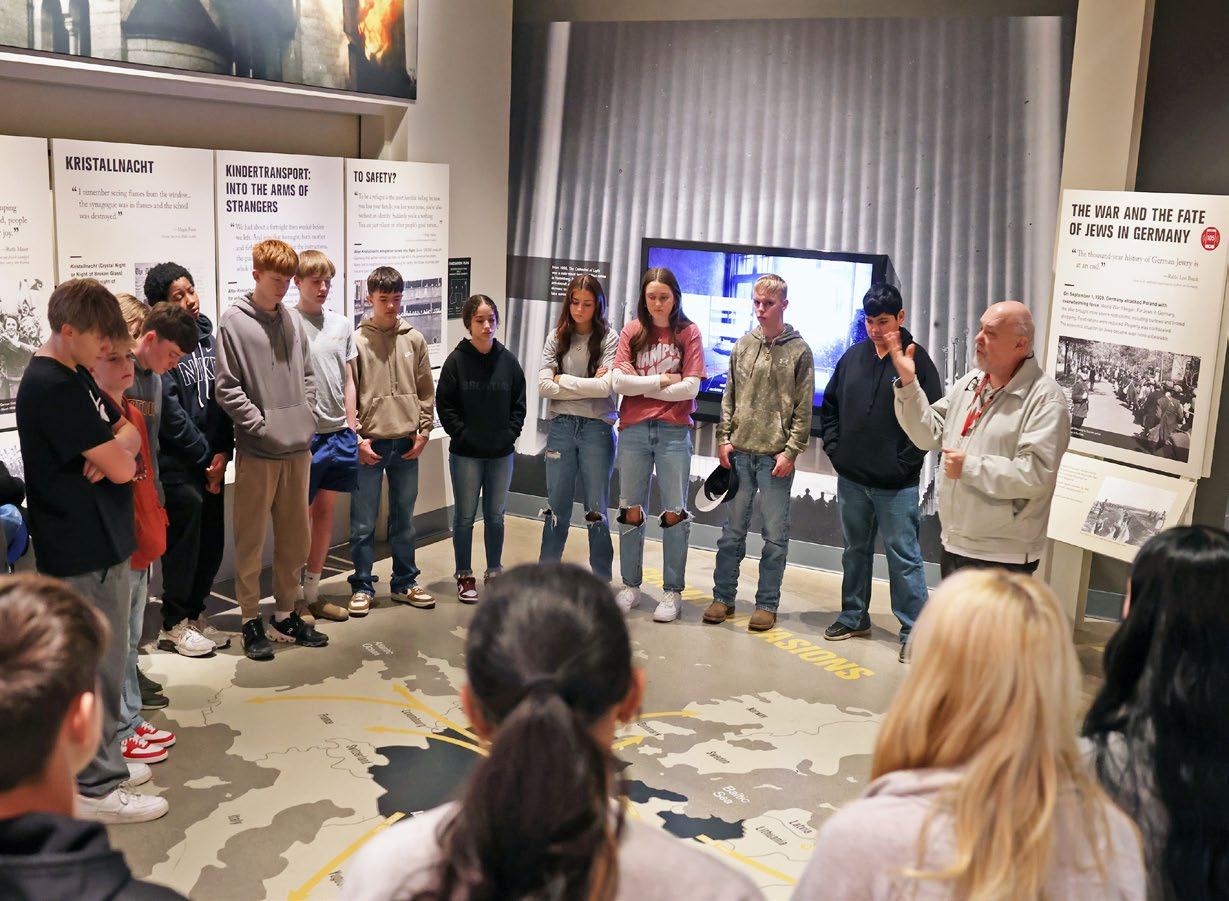
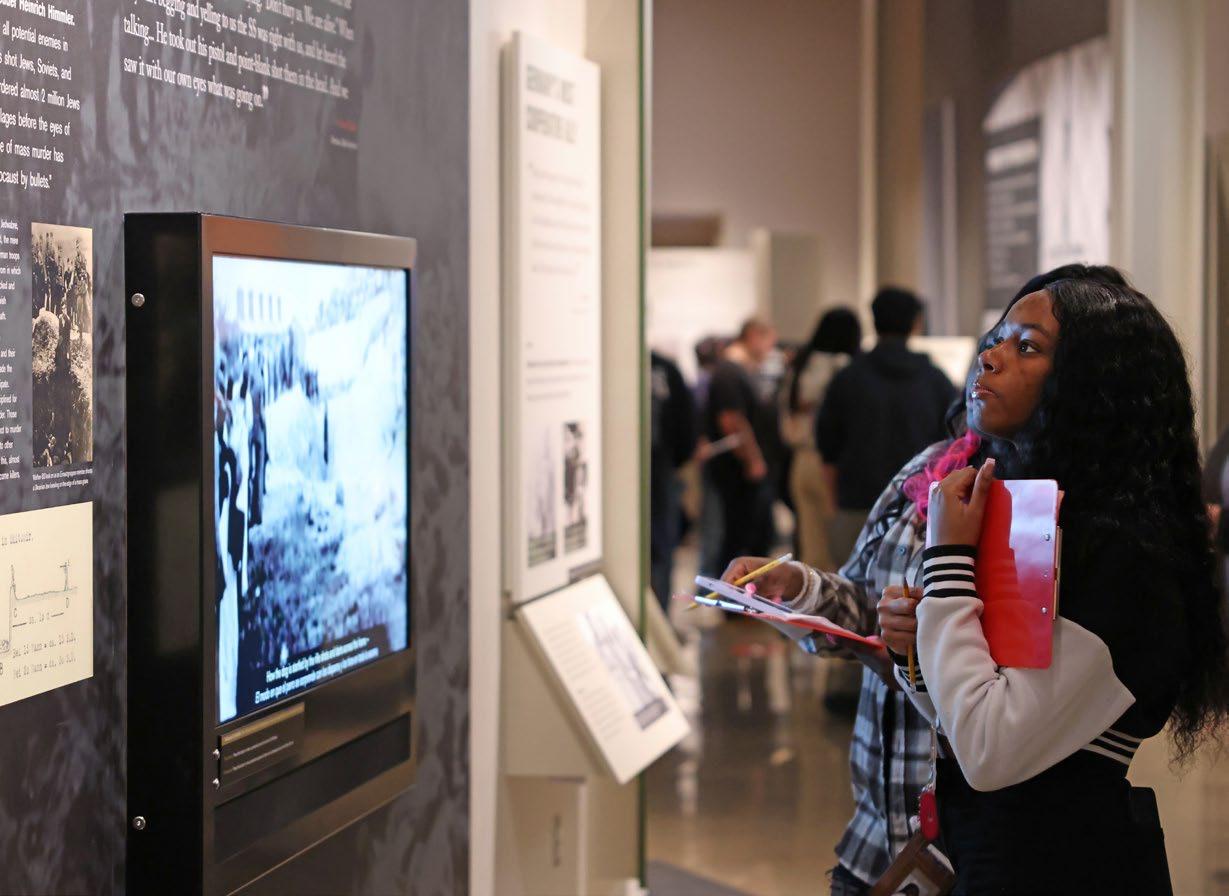



To teach the history of the Holocaust and advance human rights to combat prejudice, hatred, and indifference.
The Dallas Holocaust and Human Rights Museum does more than most history museums. Here students encounter the history of the Holocaust and America’s journey for equal rights. Through lessons that are grade appropriate and aligned to State of Texas curriculum standards, we inspire students to consider the real consequences of their choices and develop skills to become UPSTANDERS
• Stands up for other people and their rights
• Combats injustice, inequality, or unfairness
• Sees something wrong and works to make it right

Standard Tour (minimum 3 hours)
A field trip to the Museum includes a 90-minute self-guided tour of the permanent exhibition, 30-minute flex time in the Museum store, courtyard, or special exhibition, and the 45-minute survivor-based film, Voices of Courage, in the Cinemark Theater.
The permanent exhibition tour includes:
1. Orientation Wing : A brief theater experience prepares students for their exhibitionary journey. They are introduced to key concepts and asked: What kind of person am I?
2. Holocaust/Shoah Wing : This wing provides an expanded look at the history of the Holocaust. It features original artifacts, survivor testimony stations, historical films, and photography.
3. Human Rights Wing : Students are introduced to representational justice through the International Military Tribunals. They also will explore the Universal Declaration of Human Rights and the 10 Stages of Genocide.
4. Pivot to America Wing : Students explore our nation’s founding ideals and learn about Upstanders from Texas and across the United States who worked to bring those principles to reality.

Wing Focused Tour (minimum 60 minutes)
A wing-focused tour is a 60-minute self-guided experience focused on Holocaust or human/civil rights history. These tours are designed for groups that want to explore a particular wing of the permanent exhibition. They are mostly available in the afternoon.
• Holocaust/Shoah : This tour provides students with an in-depth look at the history of the Holocaust. The tour starts in the Holocaust/Shoah Wing and ends in the International Military Tribunal Gallery.
• Human Rights and Pivot to America : This tour provides students with an expanded look at the development of human rights after World War II and civil rights in U.S. history. The tour starts in the Universal Declaration of Human Rights Gallery and ends in the Pivot to America Wing.
• Dimensions in Testimony (30 minutes) : In this interactive experience from the USC Shoah Foundation, students meet a holographic Holocaust survivor in a special theater. The survivor shares their personal story and then responds to questions from the audience using voice recognition technology, inviting one-on-one ‘conversation.’ Groups up to or divided into 40 students can add on this experience.
• Speakers Bureau (60 minutes): Hear from a Holocaust survivor, child of a Holocaust survivor, or a civil rights speaker as they share their life story with your students. View our Speaker Bureau bios Here
• Education Program (60 minutes): Join a Museum Educator for an interactive program in our classroom to further explore historical or Upstander topics covered in the Museum’s exhibition. See brochure pages 6-8 for education program descriptions.
Field Trip Length:
Grades:
Group Size:
Chaperone Requirement:
Fee:
Standard: Minimum 3 hours | Wing-focused: 60 minutes
6+
Min. 15 guests / Max. 480 guests per arrival time
1 adult chaperone per 10 students
$8 per school group guest
Scholarships for qualified schools are available upon request.

A Museum Educator will lead your students on a live virtual tour of the Museum’s permanent exhibition. Students connect individually on their own devices or as a group from their classroom. As the Museum Educator walks through the exhibition, students can explore the exhibition and ask questions in real time.
Virtual tour options:
Holocaust/Shoah Wing
This tour is great for groups seeking an expanded look at the history of the Holocaust.
Human Rights Wing
This tour explores the International Military Tribunal, Human Rights, and 10 Stages of Genocide galleries. It’s ideal for educators wanting to explore into post-war world history.
Pivot to America Wing
This tour turns to Upstanders who drove change in American and Texas history.
Field Trip Length: Grades:
Group Size:
Program Fee:

Wing-specific tour: 45-60 minutes | Full exhibition tour: 90 minutes 5+
Suggested maximum of 90 participants per session
$200 up to 25 participants per session
$400 up to 50 participants per session
$720 up to 90 participants per session
Scholarships for qualified schools are available upon request. We can provide multiple sessions per day.
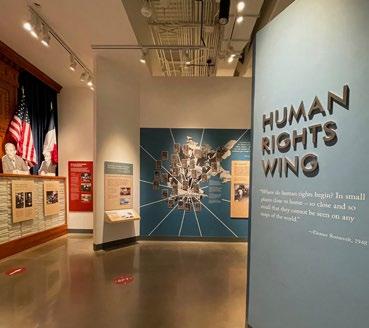


Join a Museum Educator for an interactive program to explore historical or Upstander topics covered in the Museum’s exhibition. All programs are grade- and TEKS-aligned to invite student participation and allow for group and self-reflection. Education programs can be held virtually, provided at your school, or added to your in-person field trip to the Museum.




Grades: K-3
Through a shadow puppet theater experience, students explore the lives of three American Upstanders. Each Upstander teaches students important Upstander skills. Upstander examples include Dorie Miller, Jovita Idar, and Rosa Parks.
Grades: K-3
In this creative and exploratory program, students learn how Upstander behavior influenced famous inventors and scientists to better their community. After a short Upstander introduction, students put on their inventive hats and create something to help their community.
Grades: 4-8
This interactive and creative program allows students to explore a historical topic by curating their own exhibition panel. This program pairs well with Civil Rights studies or novels such as Number the Stars, Diary of A Young Girl, or Night
Grades: 4+
This discussion-based interactive program allows students to explore what it means to be an Upstander and reflect on the impact of bystander behavior through historical examples in American and/or Holocaust history.
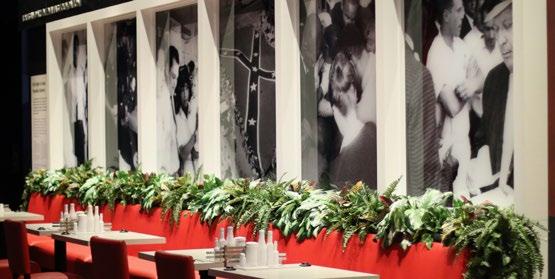




5+
Students go back in history as journalists to better understand the Dallas Civil Rights Movement. Through event photos, film footage, and eyewitness reports, they write their own front-page news stories on the Piccadilly Cafeteria civil rights sit-in or the Crystal City walkout.
6+
What are human rights and where do they begin? Students will learn how the concept of human rights has developed over time and understand how Upstanders have made a difference.
6+
This interactive program introduces students to the impact of perspective. They participate in a fun visual thinking activity unpacking how perspectives are formed in our daily lives.
This lecture-style program reviews the basic concepts of Holocaust history or genocide awareness through the 10 Stages of Genocide model. It is followed by a 10-minute Q&A that allows students to ask questions.
8+
This discussion-style program introduces students to the concepts of prejudice and hatred, analyzes the 4 factors that drive these behaviors, and using historical examples teaches them how to confront hatred and prejudice.



Length: Program Fee:
Travel Fee:
(only for at school programs)
8+
In a climate of rising antisemitism, this program offers tools to help students better understand the complexity of antisemitism and its long history. The session concludes with the impact of today’s antisemitism and strategies to stand up against it.
6+
(available at the Museum only)
This program engages students in scientific exploration and the care of artifacts. Led by Archive staff, students learn about 10 primary threats to artifacts and how to complete a condition report.
6+
(only at the Museum)
Join Museum Archivists for an interactive program featuring Holocaust and human rights artifacts from our collections. Students will examine artifacts, report on their condition, and learn about historical preservation techniques.
45 to 60 minutes per session
Up to 40 participants: $320
41 to 75 participants: $600
Over 75 participants, please contact group tours.
Program fees are per session.
Scholarships for qualified schools are available upon request.
15 miles radius: $25
30 miles radius: $45
Over 30 miles, please check availability with group tours.
Speakers offer unique insights into history for student groups at the Museum or on your campus. Their powerful stories highlight accounts of the Holocaust and U.S. civil rights. For speaker biographies, go to Speaker Bureau bios
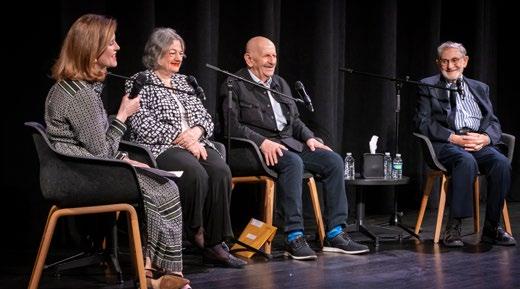
Length:
Grade Level:
Program Fee:
Travel Fee: (only for at school programs)
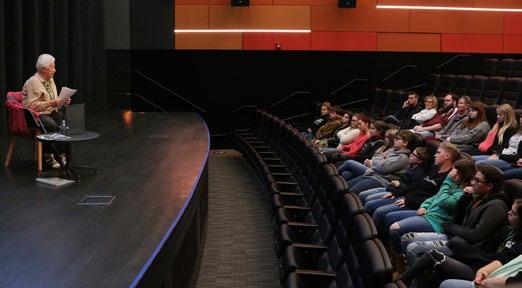
60 minutes per session
Holocaust survivor: 6+
Generations speaker: 6+
Civil rights speaker: 5+
Fieldtrip add-on at the Museum: no cost
On-Campus fee: $500
Based on private transportation travel.
Usually under $350 in the DFW Metroplex.
Homeschool Days
Join the Education Team for a day of learning designed for homeschool families including a tour of the Museum’s permanent exhibition, a Dimensions in TestimonySM experience, and an interactive classroom program.
Homeschool Day tickets are $15 per participant and can be purchased online.
2025-2026 Homeschool Days
• Tuesday, October 7
• Tuesday, November 11
• Tuesday, December 9
• Tuesday, February 17
• Tuesday, April 21
Homeschool Group Tours
Homeschool groups and co-ops with more than 15 participants may also book a student group tour and program to visit the Museum on their preferred date. Click Here to book your student tour.
Please review our student field trip and program FAQ sheet and Tour and Program Portal for additional information before submitting your request.
Museum Experience Fund scholarships are based on Title I eligibility, economically disadvantaged status, or location in ESC Regions 7 or 8. They cover admission for students and accompanying chaperones and/or education program costs. Groups with limited transportation funds can also apply for partial transportation assistance. You will have the opportunity to apply for an admission scholarship when submitting the Tour and Program Request Form.
1. Gather your information: Have your preferred tour/program dates, arrival/start time, number of students and chaperones, lunch needs, and desired add-on options ready.
2. Verify your dates and approvals: Check that your preferred dates do not conflict with your school’s calendar and are approved by your administration. Make sure to check arrival and departure time restrictions with your transportation department.
3. Submit your Tour and Program Request Form: Forms must be submitted at least four weeks prior to your requested tour/program date. You will find the online form on our Student Group Tours page or use the following direct link: https://www.dhhrm.org/visit/student-group-tours/
Requests are processed in the order that they are received. Therefore, availability cannot be confirmed in advance.
1. The Group Tours Team will email you within 7 business days to confirm the availability of your requested tour/program date and logistics. Reply to this email to continue with the reservation process.
2. The Group Tours Team will send you a Reservation Agreement. Sign and submit the Reservation Agreement upon receipt. Paid groups will also receive an Invoice with the Reservation Agreement.
3. Payment must be received at least two weeks prior to your tour/program date to receive final reservation confirmation.
4. One week prior to your tour/program the Group Tours Team will send a final reminder email with the tour schedule
For any reservation questions, please email grouptours@dhhrm.org
Our Learning and Curriculum Team assists educators in preparing students. To prepare students for a visit or program, we recommend that you sign up for the Upstander Education Database. This free database gives you access to exhibition films and testimonies, student guides, classroom lessons, and other resources.
1. Go to https://dhhrm.canto.com/v/TeachUpstanders/ and click on any item on the landing page.
2. You will be taken to the login page. Below the login box, click the “register now” button.
3. Fill out the registration form AND in the bottom left corner of the form check “use an invitation code” AND enter: wlte3lnns7q7
4. Check your email for a registration email from Canto noting your access is approved.
For any curricular information, please contact: Education@dhhrm.org.
During professional development, we help prepare teachers for a visit to the Museum and/or support them in teaching the historical topics covered in the exhibition. All our workshops are TEKS-aligned and come with CPE credit.
• Candy Brown Holocaust and Human Rights Educator Series:
This Series allows educators to connect on historical and literary topics related to the Museum's educational mission.
• Teaching About the Holocaust Series:
During the summer, we come to your local TEA Education Service Center to provide our resources and lessons on how to teach Holocaust history. This Series is in partnership with Echoes and Reflections.
• Inspire Upstander Elementary Professional Development:
This annual professional development provides K-5 educators, counselors, and librarians the learning tools, resources, and confidence to teach students the importance of empathy, acceptance, and kindness through historical Upstanders.
For more information on our professional development options, please visit: https://www.dhhrm.org/educators/educator-professional-development/
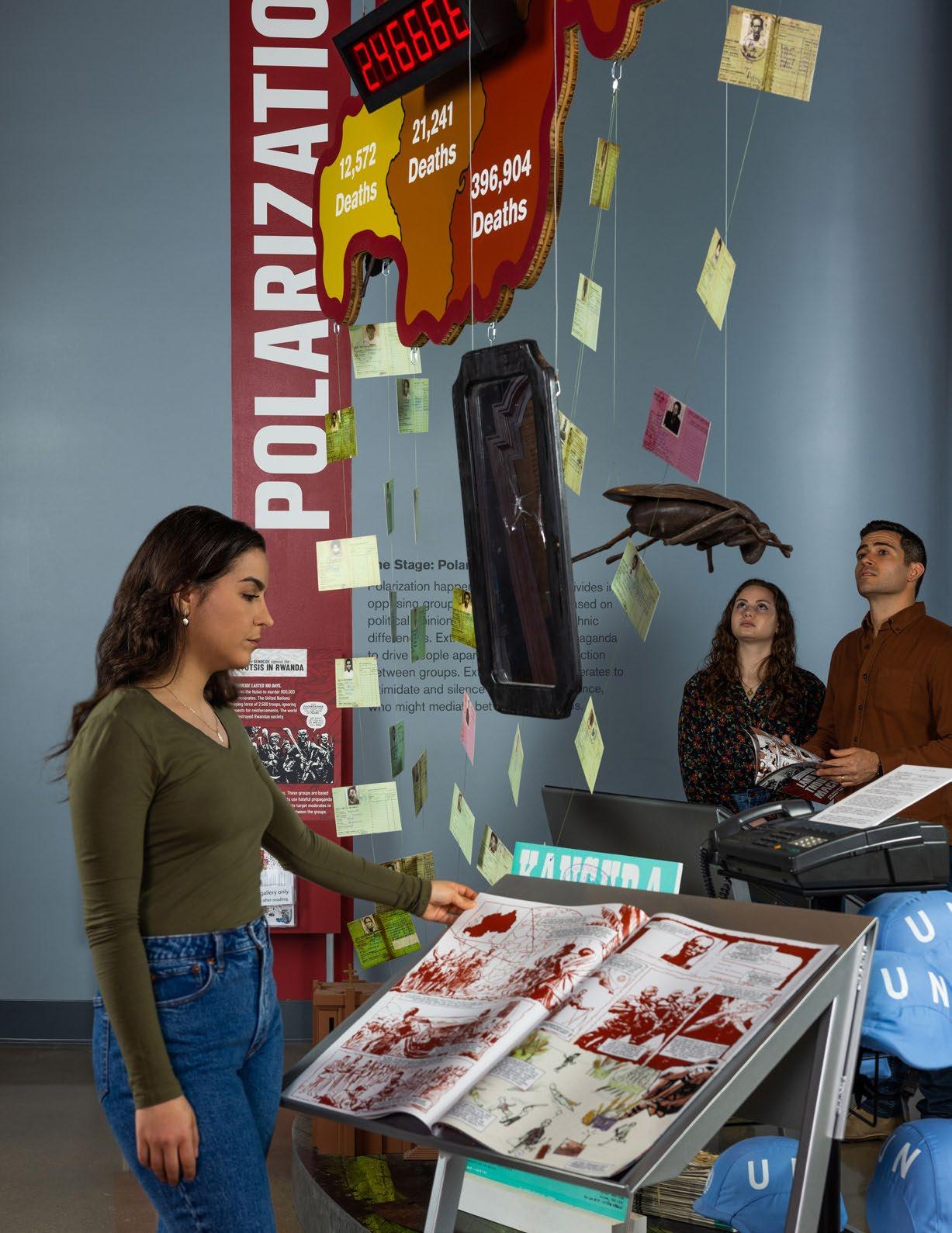
The Education Team ensures that all our tours and programs are Texas Essential Knowledge and Skills (TEKS)-aligned and grade appropriate.
In all our tours and programs, we focus on strengthening Upstander skills defined by the Texas Education Agency (TEA) as Positive Character Traits Education TEKS. We included the following Positive Character Traits TEKS in our alignment: courage, trustworthiness, integrity, respect, responsibility, fairness, caring, and good citizenship.
Inspirations: A Shadow Puppet Theater
Inventing Change: How Upstanders Inspire Future Innovators
Social Studies: K.2B; K.11; K.14B; 1.2B; 1.12; 1.17C&E; 2.2; 2.10; 2.16D
RLA:
K.1A-B&D; 1.1.A-B&D-E; 1.7A&D; 2.1; 2.7A&D; 2.13A&D-E Character Traits:
1. A & C; 2. A & B
3. C; 4. A & C-D
Social Studies: K.2B; K.11; K.14B; 1.2B; 1.12; 1.15; 1.17C&E; 2.2; 2.10; 2.13; 2.14; 2.16D
RLA:
K.1A-B&D; 1.1.A-B&D-E; 1.7A&D; 2.1; 2.7A&D; 2.13A&D-E
Character Traits:
1. A & C; 2. A & B 3. C; 4. A & C-D
Be Your Own Curator
What is an Upstander?
Reporting on History
Holocaust/Shoah Wing (virtual)
Social Studies:
3.9A-C; 3.11; 3.14B; 3.15A&D; 3.16
RLA:
3.1; 3.7A&G; 7.13A&D-E
Character Traits:
1. B & C; 2. A-B & D 3. A-C; 4. B&C
Social Studies: 3.9A; 3.11; 3.13; 3.14B; 3.15A&D; 3.16
RLA: 3.1; 3.7A&G; 7.13A&D-E
Character Traits:
1. B & C; 2. A-B & D 3. A&B; 4. B&C
Social Studies: 4.18; 4.21A-B; 4.22
RLA: 4.2; 4.3; 4.13
Character Traits:
1. B & C; 2. A-B & D 3. A&B; 4. B&C
Social Studies: 5.22; 5.25A&C
RLA: 5.2; 5.13
Character Traits:
1. B & C; 2. A-B & D
3. A&B; 4. B&C
Social Studies:
4.5A; 4.21A-B, 4.22
RLA: 4.2; 4.3
Character Traits:
1. B & C; 2. A-B & D 3. A&B; 4. B&C
Social Studies:
4.5; 4.15D; 4.21A-B, 4.22
RLA: 4.1A; 4.3
Character Traits: 1. B & C; 2. A-B & D
3. A&B; 4. B&C
Social Studies: 4.4; 4.19D; 4.21
RLA: 4.2; 4.3; 4.13
Character Traits: 1. B & C; 2. A-B & D 3. A&B; 4. B&C
Social Studies: 5.5A&C; 5.25A&C
RLA: 5.2; 5.3
Character Traits: 1. B & C; 2. A-B & D 3. A&B; 4. B&C
Social Studies: 5.5; 5.17A, 5.25A&C RLA: 5.1A; 5.3
Character Traits: 1. B & C, 2. A-B & D 3. A&B; 4. B&C
Social Studies: 5.5A; 5.5C; 5.23D; 5.25 RLA: 5.2; 5.13
Character Traits:
1. B & C; 2. A-B & D
3. A&B; 4. B&C
RLA: 5.1A; 5.7D-G; 5.10F
Character Traits: 1. B & C; 2. A-B & D
3. A&B; 4. B&C
Human Rights Wing (virtual)
Pivot to America (virtual)
5.21
5.1A; 5.7D-G; 5.10F Character Traits: 1. B & C; 2. A-B & D 3. A&B; 4. B&C
5.4; 5.14; 5.17A; 5.19; 5.21; 5.23D&E RLA: 5.1A; 5.7D-G; 5.10F Character Traits: 1. B & C; 2. A-B & D 3. A&B; 4. B&C
Tour
Holocaust/ Shoah Wing (virtual/ in-person)
6.2; 6.3D; 6.9; 6.10A-B; 6.11A, 6.12B; 6.13D; 6.19; 6.20A&C; 6.21A; 6.22
Human Rights Wing (virtual/ in-person)
6.2; 6.3D; 6.9; 6.10; 6.11A; 6.12; 6.13D; 6.19; 6.20A&C; 6.21A; 6.22
Pivot to America (virtual/ in-person)
7.10A; 7.20; 7.22A; 7.23 8.9C; 8.23A&D; 8.29A-D; 8.30A; 8.31
5A; 7B; 13A-B; 14B; 15B; 17B; 18A; 21A&E; 22C&E; 23A&D
7.2B-C& E-F; 7.6A; 7.7C; 7.10A; 7.15A; 7.20; 7.22A; 7.2
8.6B-C; 8.21B; 8.25A&C; 8.29; 8.30A; 8.31
6.2A; 6.9; 6.11A; 6.12; 6.19; 6.21; 6.22 7.2A&E-F; 7.3A&C; 7.4A; 7.6A; 7.7D; 7.10A; 7.13; 7.15; 7.17; 7.18B; 7.19F; 7.20; 7.22A; 7.23 8.3C; 8.4A-B; 8.5G; 8.6B-C; 8.7C; 8.8B&D; 8.9; 8.15CD; 8.16; 8.18B&C; 8.19; 8.21B; 8.22; 8.23; 8.24; 8.25A&C; 8.29; 8.30A; 8.31
4D; 9D; 10C; 11A-B; 12; 13A; 15A&C; 17B-D; 18B; 19B; 20; 21; 22AC; 29B; 30A&D
5A; 7B; 10A; 12B; 14B-C; 15B; 17B-D; 21A&E; 22C&E; 23A&D 6A; 8B&C; 9A&D; 10D; 13A-C&E; 14; 15A&C; 18; 19A-B&D; 20; 21B-D&F; 30A
5A; 7B; 15B; 16A; 17C-D; 21E; 22C&E; 23A&D 4H; 7C; 9A&D; 12C; 19B; 20; 28B-D; 30A
6B; 7AD; 28, 29B, 31 1B; 6F; 11A; 19A&D; 20A; 21 6.3; 6.5; 7.3; 7.5; 8.3; 8.5; E1-4; E2-4; E3-4; E4-4
4A; 8A-B&D; 9D; 11A; 28; 29B; 31
1B; 6F; 11A; 12A&C ; 19A&D; 20A; 21
3C&F; 5G; 10B; 17; 18B; 20 6B&C; 12A&D
6.3; 6.5; 7.3; 7.5; 8.3; 8.5; E1-4; E2-4; E3-4; E4-4
6-8: 1A&B; 2B&D; 3B&C; 4A&B 9-12: 1; 2A&B; 3C; 4A&B
6-8: 1A&B; 2B&D; 3B&C; 4A&B 9-12: 1; 2A&B; 3C; 4A&B
1A&B; 2A&B; 3A&C; 5A&B; 6; 7C&F; 9; 15C; 17A&D; 20; 21; 22; 23A; 25; 28; 29D, 31
1B; 6F; 11A; 12A&C 13A; 14B; 15; 16; 19A&D; 20A; 21 2D; 3; 4C&F-I; 5B-C&F; 6; 9A-D; 10; 11A; 15; 17; 18B; 20 4A; 8; 9A-C; 12A&D 6.3; 6.5; 7.3; 7.5; 8.3; 8.5; E1-4; E2-4; E3-4; E4-4 6-8: 1A&B; 2B&D; 3B&C; 4A&B 9-12: 1; 2A&B; 3C; 4A&B
Program/ Tour
Be Your Own Curator
6th: World Cult.
6.1; 6.2; 6.9; 6.11A; 6.12; 6.19; 6.21; 6.22
Reporting on History
What is an Upstander?
6.19; 6.21; 6.22
7th: Texas Hist.
7.1A; 7.7D; 7.20; 7.22; 7.23
8th : U.S. Hist. to 1877 World Geo. World History
8.3; 8.8; 8.9; 8.23; 8.30A; 8.31
15B&C; 18B; 21A&B; 22C; 23A-C
U.S. History from 1877 U.S. Govt. Ethnic Studies: Af. Am. Ethnic Studies: Mex. Am. ELAR/ English TEA Positive Character Traits
6.9; 6.13; 7F; 8F; 8.13; 8.19
What are Human Rights?
6-8: 1A-B &D; 2B&D; 3B&C; 4 9-12: 1; 2A-B&C; 3C; 4A-B&D
9; 13B; 18B;20; 25A&C; 28; 29A&B; 31 6F; 13A&B; 15; 16A; 19; 20A; 21 9A-D; 17; 18B; 19A; 20 4; 6D&E; 7C; 8; 12 7.1; 7.6; 8.1; 8.6; E112AC, 15D; E4-15D 6-8: 1A-B &D; 2B&D; 3B&C; 4 9-12: 1; 2A-B&C; 3C; 4A-B&D
6.2A&B, 6.11B; 6.12; 6.13D; 6.19; 6.21A; 6.22 7.4; 7.6; 7.7; 7.16; 7.17; 7.20; 7.22A, 7.23 8.6C; 8.8; 8.30A; 8.31 15B&C; 18B; 21A&B; 22C; 23A-C 12C; 20; 21E&F 6; 7; 9C; 25A 13A-B; 14A-B; 20A 4C-D&F; 5C; 6; 9A-D; 10; 11A; 17; 18B; 20 4A; 8; 9A-C; 12A&D 6.9; 6.13; 7F; 8F/ 8.13; 8.19
6.2A&B; 6.9B&C; 6.11B; 6.12; 6.19; 6.21A; 6.22 7.7D; 7.15A&B; 7.20; 7.22A; 7.23
8.19A-C; 8.30A; 8.31 14B&C; 15A; 22C; 23C 9D; 12C; 19A-B&D; 21 7C; 9D; 22C; 25A-D 11A; 13B; 20A&B 3C&F; 5G; 10B; 17; 18B; 20 9A-C; 12A&D 6.2; 6.5H; 6.9; 7.5H; 7.9; 8.2; 8.5H; 8.9; E12, 6, 7, 8; E2-2, 6, 7, 8; E32, 6, 7, 8; E4-2, 6, 7, 8
Power of Perspective 7.20D 8.30A&D; 8.31 19D; 21A; 22C 28D 28E 20
7.12H, 8.12H, E1-11G, E2-11G, E3-11G, E4-11G
6-8: 1A-B &D; 2B&D; 3B&C; 4 9-12: 1; 2A-B&C; 3C; 4A-B&D
6-8: 1A&B; 2B&D; 3B&C; 4A&B 9-12: 1; 2A&B; 3C; 4A&B
The Science of Preservation
6.19A; 6.21; 6.22 7.20; 7.22A; 7.23 8.29; 8.30A; 8.31 21A; 22B&C; 23A&C
Artifact Interaction
6.4; 6.11; 6.19; 6.21A; 6.22 7.21; 7.22A; 7.23 8.29; 8.30A; 8.31 21A; 22B-C; 23A&C
6.12D-H; 7.12E-H, 8.12D-H; E111F&G; E211F&G, E311F&G, E411F&G
6-8: 1B&D; 2; 3A&B; 4A&B 9-12: 6-8: 1A; 2; 3; 4A-B&D
6-8: 1A&B; 2B&D; 3B&C; 4A&B 9-12: 1; 2A&B; 3C; 4A&B
6-8: 1A&B; 2B&D; 3B&C; 4A&B 9-12: 1; 2A&B; 3C; 4A&B
Program/ Tour 6th: World Cult.
History Talk
Confronting Prejudice and Hatred
6.2B; 6.4; 6.9; 6.11; 6.13D; 6.19; 6.21A; 6.22
7.2E&F; 7.7D&E; 7.12; 7.21; 7.22A; 7.23
8.6; 8.29A; 8.30A; 8.31
:
5; 10B; 13A; 14; 15B; 16; 17; 18B; 21A&B; 22C; 23C
10C; 11B; 12A&C; 12B; 29; 30; 31
9C; 30A 5A; 15A; 18A&B; 21E; 22C 1F; 12; 14A&C; 20A&B; 28; 30A
7C-E; 29B; 30B 11A; 13A&B; 20A&B
3C; 6A; 7C; 9; 10C; 11A; 28; 29B 11A; 13A&B; 20A&B
6.2; 7.2; 8.2; E12; E2-2; E3-2; E4-2
6-8: 1A-B &D; 2B&D; 3B&C; 4 9-12: 1; 2A-B&C; 3C; 4A-B&D
8.12D-H; E111F&G; E211F&G, E311F&G, E411F&G 6-8: 1A-B &D; 2B&D; 3B&C; 4 9-12: 1; 2A-B&C; 3C; 4A-B&D
Learning and Curriculum Team
Education@dhhrm.org
Group Tours Team
Grouptours@dhhrm.org
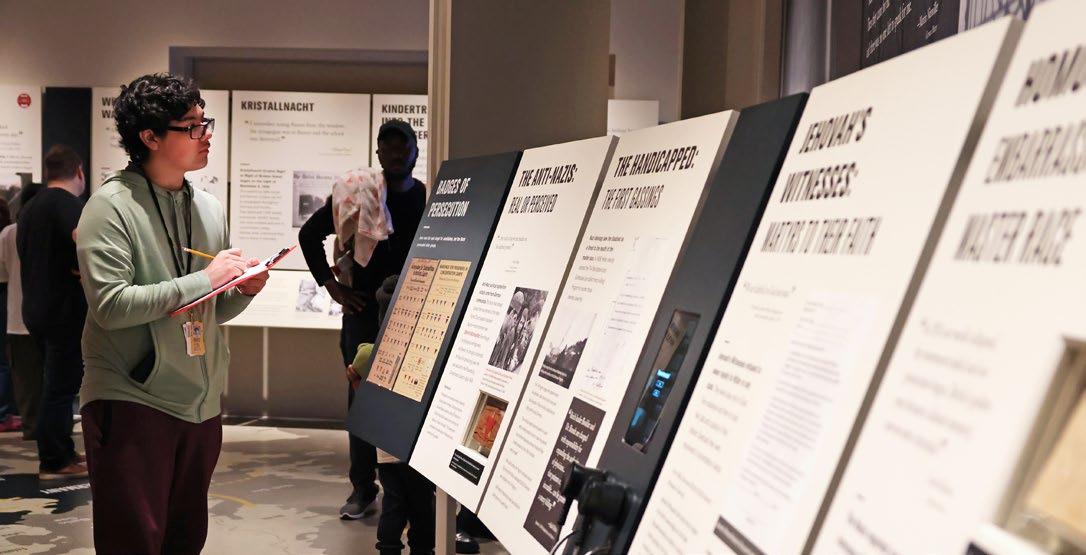
The Museum is grateful for the generosity of the following donors whose support helps to fund educational programs and Museum Experience Fund student scholarships.
Named Endowment Funds
Stuart Altman Memorial Scholarship Fund
Theodore and Beulah Beasley MEF* Endowment Fund
Fran and Mark Berg Family MEF* Endowment Fund
Candy Brown Educator Endowment Fund
Crystal Charity Ball MEF* Dallas County Endowment Fund
East Texas Initiative Endowment Fund
Fenves Family Education Endowment Fund
Funk Family Student Education Endowment Fund
Louise and Charles Gartner Student Education
Memorial Endowment Fund
Cathey and Don Humphreys Education Endowment Fund
Mike Jacobs Endowment Fund
Margot and Ross Perot MEF* Endowment Fund
Jacob Piekarevich and Morris Levy Endowment Fund
Radnitz MEF* Endowment Fund
Edward W. "Rusty" Rose III Endowment Fund
Melissa and Matthew Rubel MEF* Endowment Fund
* Museum Experience Fund
Foundations and Corporations
Anonymous (2)
Edward and Wilhelmina Ackerman Family Foundation
The Leslie Allen Charitable Foundation
Amazon
The Ninnie L. Baird Foundation
The Theodore and Beulah Beasley Foundation
Alice E. and Joseph C. Blewett Foundation
BNSF Railway Foundation
Communities Foundation of Texas
Crowley-Carter Foundation
The Crystal Charity Ball
The Dudley T. Dougherty Foundation
Garvey Texas Foundation
The Hirsch Family Foundation
Humanities Texas
Jewish Federation of Fort Worth and Tarrant County
Junior League of Dallas
Carl B. and Florence E. King Foundation
Lupe Murchison Foundation
The Aileen & Jack Pratt Foundation
Sam Roosth Foundation
The Rosewood Foundation
Foundations and Corporations (continued)
JHCA Housing Foundation
Central Market/H-E-B
The Rainwater Charitable Foundation
Santander Consumer USA Foundation
Dennis Schuman Charitable Foundation
State Fair of Texas
Temple Shalom Brotherhood
Texas Bar Foundation
Texas Capital Foundation
Toyota
M.B. and Edna Zale Foundation
Annual Donors
Anonymous
Lynette Aguilar
Lisa Albert, Katherine Albert, and Sara and Mark Albert in honor of Ginette Albert
Rivka and Bradley Altman
Candy and Ike Brown
Sandra and Gary Fernandes
Marsha Gaswirth
Liz and Tom Halsey
Ynette and Jim Hogue
Nancy Ann and Ray L. Hunt
Ronit and Haviv Ilan
Veronique and Hylton Jonas
Leslie and David Katz
Mindy Kobrin
Kristin and Sandy Lobenstein
Bobbi and Richard Massman
Carol and Harold Pinker
Sheri and Andrew Rosen
Sylvia Cespedes and Hernan Saenz
The Honorable Florence Donald Shapiro and Howard Shapiro
Daphne and Jay B. Shipowitz
Alice and Jim Skinner
Laurie and David Sokolsky
Geraldine Acuña-Sunshine and Gabe Sunshine
Daphne and David Sydney
Keitha Wright
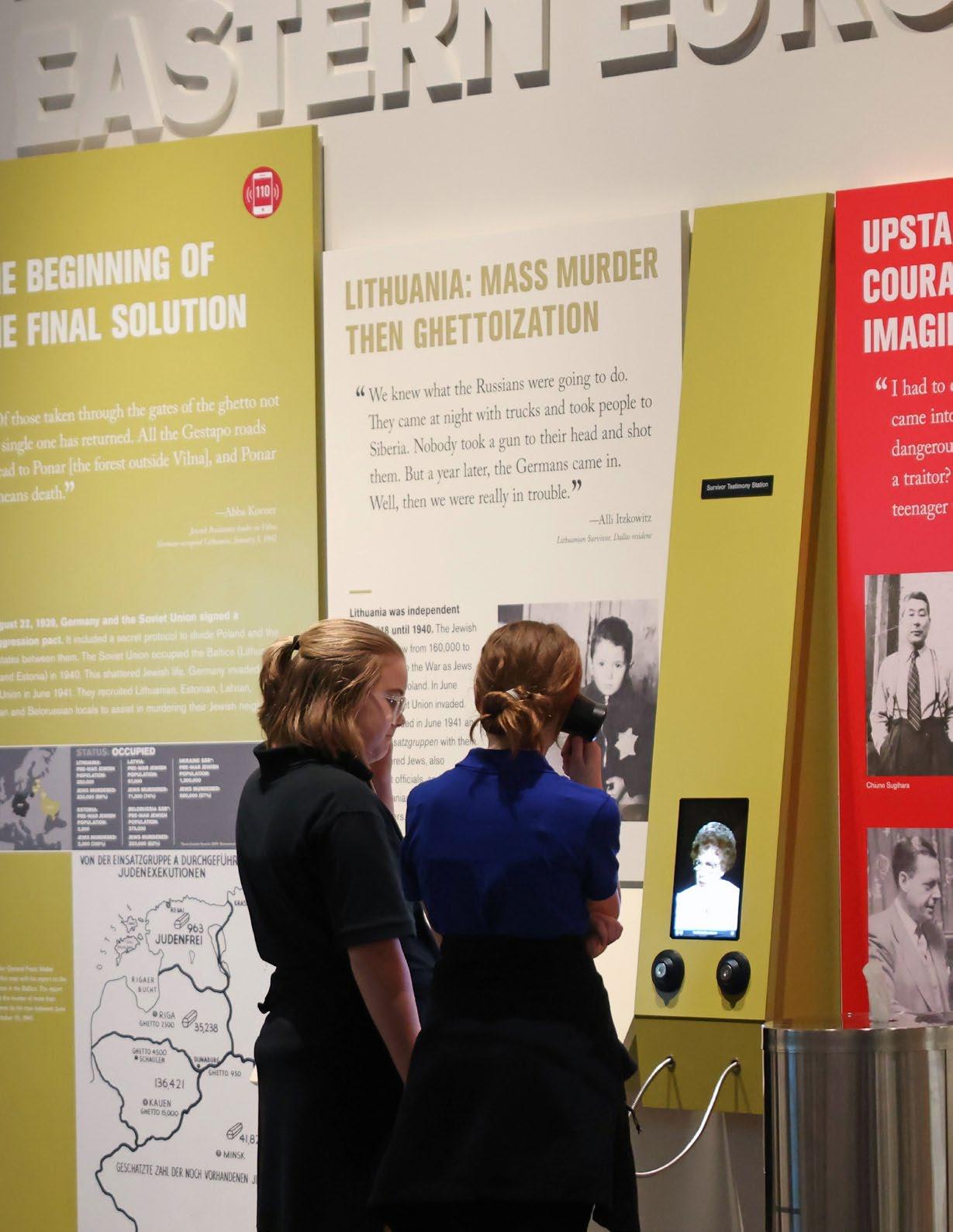
dhhrm.formstack.com/forms/student_tour_program_request_form
dhhrm.formstack.com/forms/student_tour_program_request_form (select "yes" for "scholarship requested" on the form)